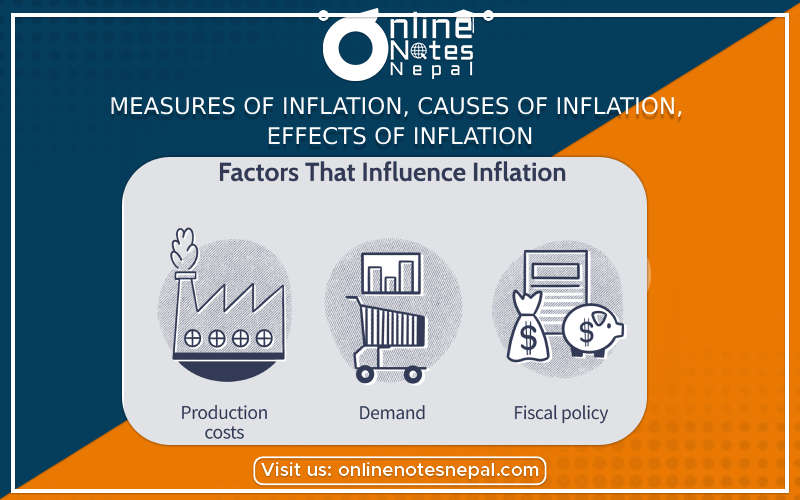Published by: Dikshya
Published date: 07 Jul 2023

Inflation:
Inflation refers to sustained increase in the general price level of goods and services in an economy over a time period. It is often measured by various indices that track changes in prices, such as Consumer Price Index (CPI) or the Producer Price Index(PPI).
Measures of Inflation:
Measures of inflation are statistical tools used to quantify and track changes in the overall price levels of goods and services in an economy. CPI and PPI are most commonly used measures of inflation. CPI reflects the average price change of a basket of goods and services consumed by households. PPI tracks change in prices received by producers for their output.
The GDP deflator provides an overall measure of price changes for all goods and services produced in an economy. Personal Consumption Expenditure (PEC) Price Index offers a broader perspective on consumer prices. Core inflation measures exclude volatile items, and trimmed mean inflation eliminates extreme outliers to provide more stable inflation indicators.
Therefore, following are the measures of Inflation:
- Consumer Price Index (CPI)
- Producer Price Index (PPI)
- GDP Deflator
- Personal Consumption Expenditures (PEC) Price Index
- Core Inflation Measures
- Trimmed Mean Inflation
- Sticky Price Index
Causes of Inflation:
1. Demand- Pull Inflation:
This type of inflation occurs when the aggregate demand for goods and services exceeds the available supply. It can be caused by factors such as increased consumer spending, government spending, or investment. When demand outpaces supply, prices rise as businesses try to meet the increased demand.
2. Cost- Push Inflation:
Cost- push inflation happens when the costs of production increase, leading to higher prices for final goods and services. Factors that can contribute to cost-push inflation include rising wages, increased raw material costs, higher energy prices, or supply chain disruptions.
3. Monetary inflation:
Monetary Inflation occurs when there is an excessive growth in the money supply relative to the growth of the economy’s production capacity. This can happen due to expansionary monetary policies, such as lowering interest rates or implementing quantitative easing, which increases the availability of money in the economy.
4. external Factors:
Changes in international trade, exchange rates, or commodity prices can also impact inflation. If a country imports a significant portion of its goods and experiences a depreciation in its currency, the cost of imports can increase, leading to higher prices for imported goods and potentially influencing overall inflation.
5. Government Policies and Regualations :
Government actions, such as changes in tax policies, minimum wage laws, or price controls, can affect inflation.
1. Inflation erodes the purchasing power of money over time. As prices rise, the same amount of money can buy fewer goods and services, leading to a decrease in the standard of living for individuals and households.
2. Inflation occurs uncertainty in the economy, making it difficult for businesses and individuals to plan for the future.
3. Inflation can lead to a redistribution of income and wealth within a society.
4. Inflation can disort price signals in an economy.
5. Inflation affects interest rates, as central banks may raise interest rates to curb inflationary pressures.